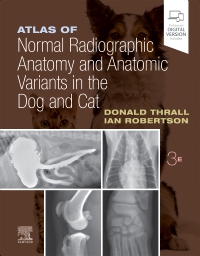
Atlas of Normal Radiographic Anatomy and Anatomic Variants in the Dog and Cat - Elsevier EBook on VitalSource, 3rd Edition
Elsevier eBook on VitalSource

Equip your students to make accurate diagnoses and achieve successful treatment outcomes with this highly visual, comprehensive atlas! Featuring a substantial number of new high-contrast images, Atlas of Normal Radiographic Anatomy and Anatomic Variants in the Dog and Cat, 3rd Edition, provides an in-depth look at both normal and non-standard subjects, along with demonstrations of proper technique and image interpretations. Expert authors Donald E. Thrall and Ian D. Robertson describe a wider range of "normal" as compared to other books — not only showing standard dogs and cats, but also non-standard subjects such as overweight and underweight pets and animals with breed-specific variations. Each body part is put into context with a description that helps explain why a structure appears as it does in radiographs, enabling students to appreciate variations of normal based on an understanding of basic radiographic principles.
-
- NEW! Expanded coverage of the neonatal and juvenile subject includes additional radiographic examples
- NEW! Additional material on the normal appearance of some of the more common special procedures performed in private practice includes barium esophagram, barium gastrointestinal study, and positive contrast cystogram
- NEW! Coverage of shoulder arthrography illustrates the normal expected location of the joint capsule
- NEW and UPDATED! Radiographic images of normal or standard prototypical animals are supplemented by images of non-standard subjects exhibiting breed-specific differences, physiologic variants, or common congenital malformations.
- NEW! Enhanced ebook, included with the purchase of a new print copy of the book, provides online access to a fully searchable version of the text and makes its content available on various devices
- UPDATED! Brief descriptive text and explanatory legends accompany all images to help put concepts into the proper context
- High-quality digital images provide excellent contrast resolution and better visibility of normal structures to facilitate making accurate diagnoses
- In-depth coverage of patient positioning and radiographic exposure guidelines assists in producing the very best results
-
- NEW! Expanded coverage of the neonatal and juvenile subject includes additional radiographic examples
- NEW! Additional material on the normal appearance of some of the more common special procedures performed in private practice includes barium esophagram, barium gastrointestinal study, and positive contrast cystogram
- NEW! Coverage of shoulder arthrography illustrates the normal expected location of the joint capsule
- NEW and UPDATED! Radiographic images of normal or standard prototypical animals are supplemented by images of non-standard subjects exhibiting breed-specific differences, physiologic variants, or common congenital malformations
- NEW! Enhanced ebook, included with the purchase of a new print copy of the book, provides online access to a fully searchable version of the text and makes its content available on various devices
-
1. Basic Imaging Principles and Physeal Closure Time
2. The Skull
3. The Spine
4. The Thoracic Limb
5. The Pelvic Limb
6. The Thorax
7. The Abdomen


 as described in our
as described in our 